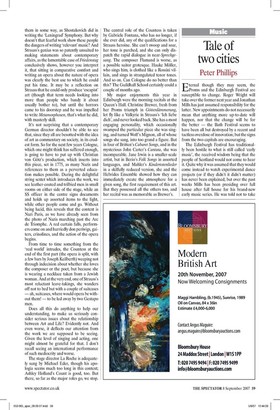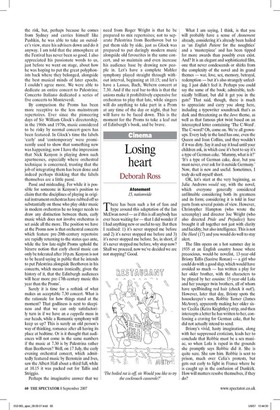Tale of two cities
Peter Phillips E:ternal though they may seem, the Proms and the Edinburgh Festival are susceptible to change. Roger Wright will take over the former next year and Jonathan Mills has just assumed responsibility for the latter. New appointments do not necessarily mean that anything more up-to-date will happen, nor that the change will be for the better — the Bath Festival seems to have been all but destroyed by a recent and tactless overdose of innovation; but the signs from the two capitals are encouraging.
The Edinburgh Festival has traditionally been hostile to what is still called 'early music', the received wisdom being that the people of Scotland would not come to hear it. Quite why it was assumed that they would come instead to watch experimental dance projects (or if they didn't it didn't matter) has never been explained, but over the past weeks Mills has been presiding over full house after full house for his brand-new early music series. He was told not to take the risk, but, perhaps because he comes from Sydney and carries himself like Pushkin, he was able to take an outsider's view, stare his advisers down and do it anyway. I am told that the atmosphere at the Festival has never been so good. I also appreciated his passionate words to us, just before we went on stage, about how he was hoping to put the great polyphonists back where they belonged, alongside the best musical minds of later epochs. I couldn't agree more. We were able to dedicate an entire concert to Palestrina; Concerto Italiano dedicated a series of five concerts to Monteverdi.
By comparison the Proms has been more receptive to the less mainstream repertoires. Ever since the pioneering days of Sir William Glock's directorship, in the 1960s and 1970s, music considered to be risky by normal concert-goers has been featured. In Glock's time the labels 'early' and 'contemporary' were prominently used to show that something new was happening; now I have the impression that Nick Kenyon is playing down such apartnesses, especially where orchestral technique is concerned, trusting that the job of integrating them has been done and indeed perhaps thinking that the labels themselves are a little passé.
Passé and misleading. For while it is possible for someone in Kenyon's position to claim that the disciplines of playing in original instrument orchestras have rubbed off so substantially on those who play older music in modern orchestras he no longer needs to draw any distinction between them, early music which does not involve orchestras is set aside all the more. The position we have at the Proms now is that orchestral concerts which feature pre-20th-century repertoire are rapidly returning to the status quo ante, while the few late-night Proms uphold the bizarre notion that early choral music can only be tolerated after 10 p.m. Kenyon is not to be heard saying in public that he intends to put Palestrina alongside Beethoven in his concerts, which means ironically, given the history of it, that the Edinburgh audiences will hear more pre-17th-century music this year than the Proms'.
Surely it is time for a rethink of what makes an acceptable 7.30 concert. What is the rationale for how things stand at the moment? That godliness is next to sleepiness and that we can only satisfactorily turn in if we have an a cappella mass in our heads, while a Romantic symphony will keep us up? This is surely an old person's way of thinking, romance after all having its place at bedtime. Or is it thought that audiences will not come in the same numbers if the music at 7.30 is by Palestrina rather than Beethoven? Well, on 17 July, the early evening orchestral concert, which admittedly featured music by Bernstein and Ives, saw the Albert Hall about a third full, while at 10.15 it was packed out for Tallis and Striggio.
Perhaps the imaginative answer that we need from Roger Wright is that he be prepared to mix repertoires; not to separate Palestrina from Beethoven but to put them side by side, just as Glock was prepared to put daringly modern music alongside old favourites in the same concert, and so maintain and even increase his audience base by drawing new people in. Let's have a complete Mahler symphony played straight through without interval, beginning at 10.15; and let's have a Lassus, Bach, Webern concert at 7.30. And if the real bar to this is that the unions make it prohibitively expensive for orchestras to play that late, while singers will do anything to take part in a Prom at any time of the day or night, that bar will have to be faced down. This is the moment for the Proms to take a leaf out of Edinburgh's book, and be brave.




































































 Previous page
Previous page